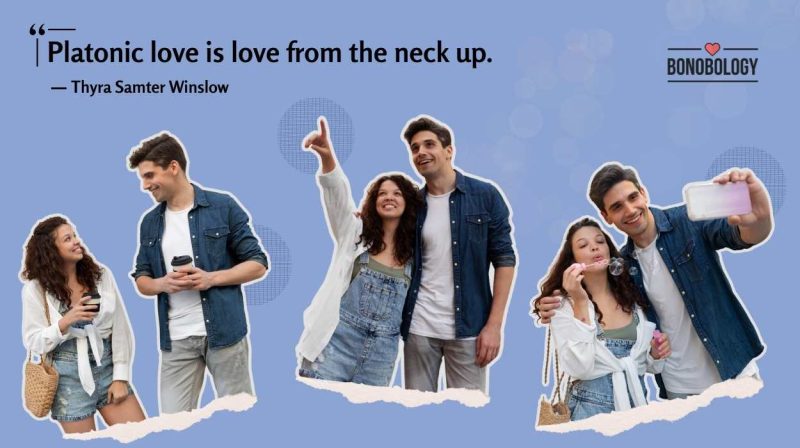Have you ever experienced a platonic crush that caught you off guard, leaving you in a whirlwind of conflicting emotions? I vividly remember a time when I found myself entangled in a platonic crush, a peculiar cocktail of admiration, friendship, and a subtle longing.
This peculiar episode unfolded when a woman entered my life, effortlessly turning ordinary moments into extraordinary ones. She possessed an undeniable charm that went beyond conventional romantic appeal, sparking a unique connection that left me grappling with my newfound understanding of a platonic crush.
As I navigated this uncharted territory, I found myself questioning the nature of my feelings and contemplating the significance of this connection that defied easy categorization. Little did I know, this experience would prompt me to explore the meaning, signs, and possible courses of action one takes when confronted with a platonic crush.
What Is A Platonic Crush?
Table of Contents
A platonic crush, often referred to as platonic attraction or a friend crush, is a fascinating phenomenon that resides in the gray area between friendship and romantic feelings. The term ‘platonic crush’ is often used to describe feelings that go beyond mere friendship, but without developing into a romantic relationship. Unlike a traditional romantic crush, a platonic crush involves experiencing a deep sense of admiration and affection for someone without the romantic or sexual undertones.
In essence, platonic crush meaning boils down to an attraction that is built on a strong emotional connection. Is there such a thing as a platonic crush while in a relationship? Yes. It’s entirely possible to experience a platonic crush without jeopardizing the commitment to a romantic partner. You must embrace your feelings of platonic attraction and ensure open communication with your partner, in order to maintain a healthy and transparent relationship with them.

Significance of platonic crushes for asexual and aromantic communities
Let’s explore the concept of platonic crushes in the context of romantic and non-romantic inclinations. Within the asexual and aromantic communities, where individuals fall on the ace and aromantic spectrum, the idea of platonic relationships and crushes holds particular significance. Many asexual and aromantic people experience deep and meaningful connections that are non-romantic or non-sexual, highlighting the richness and diversity of platonic love. Within this context, the term ‘queerplatonic relationship’ is often used to describe intense, emotionally intimate connections that surpass the boundaries of traditional friendship.
Researchers have spoken about sexual and romantic orientations too: “Aromanticism, which is less widely known than asexuality, is most commonly used to describe people who experience low to no romantic attraction … [Asexual and aromantic] people have different experiences of sexual and romantic attraction, which is referred to as “differentiated attraction.” In essence, a platonic crush challenges societal norms. It invites us to recognize the validity of non-romantic affections and appreciate the various dimensions of love that extend beyond the romantic and sexual realm.
Related Reading: 8 myths about Asexuals (ASE)
What’s The Difference Between A Platonic Crush And A Romantic Crush?
The feelings of a platonic crush and a romantic crush may overlap, but they are not the same. A platonic crush, sometimes referred to as a friend crush, involves a deep emotional bond and intense feelings of admiration and affection for someone, akin to the warmth of a close friendship — but without the romantic or sexual elements commonly associated with a romantic crush. So, this kind of emotional attraction is different from crushing on a friend. To illustrate the differences more clearly, let’s examine the key distinctions between a platonic crush and a romantic crush:
| Platonic Crush | Romantic Crush |
| A platonic crush primarily involves admiration and affection | Involves romantic feelings and, at times, sexual attraction |
| It often develops within the context of close friendships or even acquaintances | Typically arises in the pursuit of a romantic or physical relationship |
| Platonic feelings focus on seeking a deep emotional connection. The aim may or may not be a platonic relationship | Encompasses both emotional and physical aspects, aiming for a romantic relationship |
| Does not necessarily lead to a romantic partnership or romantic feelings | Often involves envisioning a romantic relationship with the person |
| Can be experienced within various types of connections and relationships | Typically forms with only those you consider your ‘type’ — the kind of people whom you experience feelings of romantic or sexual attraction for |
| Can coexist with platonic or romantic feelings that you may experience for others too | Often prompts the desire for exclusivity and commitment in a romantic relationship |
Related Reading: 10 Signs Of Emotional Attraction From A Man
One Reddit user talks about platonic crushes and romantic crushes, “Imagine doing something with that person you consider a “partner-only” or “date-only” activity, like kissing or cuddling or going to the movies and holding hands. It doesn’t need to be sexual, but it does need to be something you consider exclusively “romantic,” as in, something you’d not do with the platonic friends you have. If the thought of romantic interludes feels right, it may be a romantic crush. If the thought feels weird, it may be platonic … It’s okay too if you think it’s one thing and it turns out to be the other. Feelings are complicated and weird and often irrational and ineffable.”
Understanding these differences between a romantic crush and a platonic crush helps individuals navigate the complex landscape of human emotions. And also puts the platonic crush meaning in perspective. It provides clarity in relationships, particularly when addressing feelings of admiration and attraction.
7 Signs You Have Got A Platonic Crush
Deciphering whether your feelings for someone are platonic or romantic can be quite a head-scratcher. If you find yourself wondering what is platonic attraction, or whether or not you have a platonic crush, here are seven platonic crush signs that might help you unravel the mystery.
1. You find joy in their company
If spending time with this person evokes the same joy and fulfillment you experience with your closest friends, you might have a platonic crush. Whether it’s shared laughter, common interests, or simply enjoying each other’s company, the connection feels akin to the comfort found in strong friendships. But there’s more.
2. You think about them a lot
One unmistakable sign of a platonic crush is the persistent nature of thoughts about the person that occupies your mind. It’s a peculiar sensation of daydreaming that unfolds without a trace of a sexual or romantic agenda — a feeling quite different from romantically crushing on a friend. Your thoughts may meander into scenarios where you envision sharing laughter over a cup of coffee, discussing life’s intricacies, or embarking on adventures together.
Related Reading: 23 Signs Your Soulmate Is Thinking Of You – And They Are All True!
3. You feel comfortable as you are
What is platonic attraction? As mentioned before, it is a sense of a deep emotional connection with another person. Unlike the complexities often associated with romantic relationships, a platonic crush tends to bring a sense of comfort and lower stress levels. The dynamics are built on genuine friendship, free from the complications that can arise in romantic entanglements.

4. You might be aromantic
The term ‘aromantic’ serves as an umbrella term for those who may experience little to no romantic attraction. In aromantic communities or among individuals on the aromantic spectrum, platonic crushes hold particular significance. These connections allow for deep bonds without the desire for romance. So if you’re aromantic, that’s a pretty good sign that the person you can’t stop thinking about is your platonic crush.
Related Reading: What Is Platonic Dating? Does It Practically Work Out In Real Life?
5. You feel happy for them when they find romantic love
One distinctive trait of someone navigating a platonic crush is the genuine happiness they feel for their crush’s romantic or sexual escapades. In contrast to a romantic crush where such developments might evoke feelings of jealousy or disappointment, many people with a platonic crush revel in the joy of witnessing their friend find happiness in romantic connections. This kind of unconditional love is one of the many ways a platonic crush is different from romantically crushing on a friend.
Unless, of course, their crush starts neglecting them after getting into a relationship with someone. It’s akin to but worse than when a friend you adore stops investing in your friendship when they find a new support system.
6. You experience a deeper level of intimacy with them
A platonic crush often involves a deeper level of intimacy that goes beyond surface-level interactions. This intimacy is characterized by emotional closeness and genuine care for the other person, fostering a meaningful connection without the expectations of a romantic relationship. Engaging in conversations that transcend small talk is a key sign of a platonic crush.
Related Reading: Platonic Soulmate: What Is It And 11 Signs You’ve Found Yours
7. You have a genuine interest in the events of their life
Your interest in the person’s life is sincere, devoid of any romantic or sexual motives. You care about their well-being, aspirations, and experiences on a personal level, showcasing a connection that goes beyond the parameters of a romantic relationship.
Understanding these signs helps in navigating the boundaries of platonic crushes and platonic relationships, allowing for genuine connections to flourish without the added pressure of romantic expectations or the fear that you’ll lose a friend. It creates a space where both individuals can enjoy a meaningful connection, even though it’s not yet understood by society in general.
Pros And Cons Of Having A Platonic Crush
Navigating the terrain of platonic crushes, those intriguing bonds that straddle the line between friendship and something more, involves a rollercoaster of emotions. As we find ourselves drawn to someone in a way that goes beyond conventional friendships and into the realm of aromantic relationships, the landscape is dotted with both pros and cons. The allure of a deep emotional connection and the comfort of a meaningful friendship beckon on one side, while the potential for unrequited feelings and the need to navigate nuanced boundaries loom on the other. As we explore the pros and cons of having a platonic crush, we’ll shed light on the joys and challenges that accompany these unique and sometimes complex relationships.
Pros of having a platonic crush
- Deep emotional connection: A platonic crush often leads to a deep emotional connection with the person, fostering a strong bond based on shared interests, understanding, and mutual respect
- Increased confidence: Recognizing and dealing with a platonic crush can boost your confidence, as it requires self-awareness and emotional intelligence to navigate the complexities of your feelings
- Diversity of love: Platonic crushes contribute to the overall richness of your social connections and channels of love. This can enhance your support system and create lasting, meaningful friendships
- No romantic expectations: Unlike romantic crushes, platonic crushes don’t come with the pressure of romantic expectations. This can lead to a more relaxed and enjoyable relationship, allowing both individuals to be themselves without the added complexities of romance
- Support system: The person you have a platonic crush on can become a reliable source of emotional support. Sharing your thoughts, concerns, and joys with them can contribute to a healthy and supportive connection
Related Reading: The Yin And Yang Of The Sexuality Spectrum
Cons of having a platonic crush
- Unrequited feelings: One of the main challenges of a platonic crush is the possibility of unrequited feelings. If the other person doesn’t share the same level of attraction, it can lead to emotional distress and disappointment
- Navigating boundaries: Understanding how to navigate the boundaries of a platonic crush can be tricky. It requires open communication to ensure both individuals are comfortable with the nature of the relationship
- Potential impact on other relationships: If you are in a romantic relationship, having a platonic crush may pose challenges. It’s important to handle these feelings with sensitivity to avoid any strain on existing relationships
- Emotional turmoil: Dealing with a platonic crush can sometimes be emotionally challenging as it challenges the norms of conventional relationships. Sorting through your feelings, especially if they are conflicting, may require introspection and self-reflection
- A source of distraction: A strong platonic crush might become a distraction, taking up mental and emotional space that could be directed elsewhere. This distraction could potentially affect other aspects of your life if not managed appropriately

Understanding the pros and cons of having a platonic crush allows individuals to navigate these feelings with greater awareness, making informed decisions about how to approach and manage such relationships.
What To Do If You Like Someone Platonically?
If you have platonic feelings for a person, you’ll require a delicate balance of understanding your needs and respecting the boundaries of the relationship. If you find yourself liking someone platonically, consider the following steps:
- Self-reflection: Take some time to reflect on your feelings and understand the nature of your attraction. Identify whether your emotions are truly platonic or if there are underlying romantic or sexual aspects
- Acceptance: Embrace and accept your feelings without judgment. Platonic connections are valuable and can contribute to fulfilling friendships. Acknowledge that it’s okay to have deep, non-romantic affections for someone
- Open communication: If you feel comfortable, communicate openly with the person about your platonic feelings. Honest conversations can strengthen your friendship and help ensure that both parties are on the same page regarding the nature of your relationship
- Respect boundaries: Be mindful of the other person’s feelings and boundaries. Not everyone may interpret or respond to platonic feelings in the same way. Respect their comfort level and be prepared for varying responses
- Enjoy the connection: Focus on nurturing the bond without letting platonic feelings overshadow the enjoyment of each other’s company. Embrace shared interests, engage in meaningful conversations, and celebrate the positives of your connection
- Manage expectations: Keep expectations realistic and in line with the nature of your relationship. Platonic crushes don’t necessarily lead to platonic relationships, so it’s important to manage expectations to avoid potential disappointments
- Explore other interests: Diversify your social circle and engage in activities that allow you to form connections with a variety of people. This can help balance your emotions and prevent fixation on a single platonic crush
- Seek support: If needed, confide in friends or seek support from those who can provide guidance. Sharing your feelings with trusted individuals can offer valuable perspectives and help you process your emotions
- Be mindful of existing relationships: If you are in a romantic relationship, be mindful of how your platonic feelings might impact it. Open communication with your romantic partner is crucial to maintaining trust and understanding
- Focus on personal growth: Channel your energy into personal growth and self-improvement. Sometimes, platonic crushes can serve as catalysts for self-discovery and personal development
Related Reading: 18 Types Of Sexualities And Their Meanings
Remember, platonic feelings are a natural part of human relationships, and understanding and managing them can lead to enriching and fulfilling connections.
Key Pointers
- A platonic crush involves feelings of admiration and affection toward someone
- Unlike a romantic crush, a platonic crush does not have any sexual or romantic undertones
- If this person brings you joy and allows you to feel comfortable in your skin and you think about them a lot, you may have a platonic crush on them
- If you do have a platonic crush on someone, it’s a good time for self-reflection and open communication while respecting their boundaries
- Your feelings may hopefully lead to either a platonic partnership or a beautiful friendship with your crush
The journey of liking someone platonically is a testament to the multifaceted nature of love and relationships. Embracing the diversity of human bonds, whether romantic or platonic, encourages personal growth, enriches our understanding of others, and adds vibrant hues to the tapestry of our lives. As we conclude this exploration, let us celebrate the beauty of platonic crushes as valuable expressions of human connection.
Could You Be In A Romantic Friendship With Someone? 7 Signs That Say So
Your contribution does not constitute a charitable donation. It will allow Bonobology to continue bringing you new and up-to-date information in our pursuit of helping anyone in the world to learn how to do anything.
Ask Our Expert
You must be Logged in to ask a question.


Featured
How to Tell Someone You Just Want to Be Friends: 15 Examples
15 Best Apps to Make Friends
Maid of Honor Duties Explained: The Ultimate To-Do List
21 Fun Bachelorette Party Games To Amp Up The Naughty Quotient
Casual Dating Vs. Friends With Benefits – 10 Key Differences
Falling In Love With A Friend – What Next?
What Are Platonic Relationships? Types, Benefits, Rules, And Everything You Need To Know
10 Unspoken Boundaries For Being Friends With An Ex
15 Boyfriend-Female Friends Boundaries To Swear By
Everything On How To Be Friends With Your Ex
18 Friends-With-Benefits Rules To Swear By
20 Signs He Wants To Be More Than Friends
15 Signs He Cares More Than You Think
Does She Like Me More Than A Friend – Solving The Dilemma
15 Types Of Situationships And Their Signs
How To Get Someone To Stop Texting You Without Being Rude
Platonic Soulmate: What Is It And 11 Signs You’ve Found Yours
Toxic Masculinity And Homophobia Within Male Friendships
How To Get Over A Friendship Breakup
What Do Guys Think Of Their Female Friends?